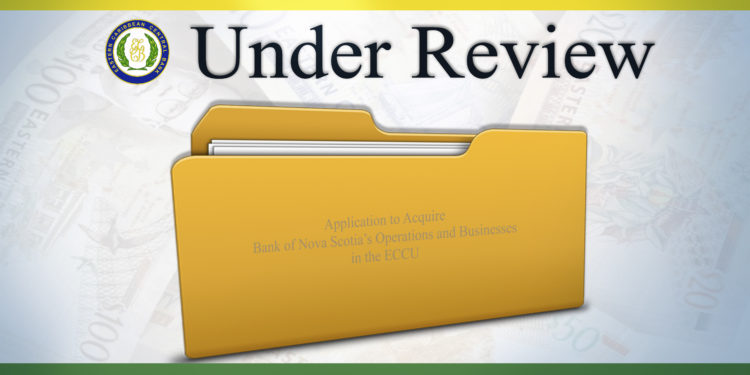1 December 2018, Basseterre, St Kitts and Nevis – The Eastern Caribbean Central Bank (ECCB) hereby confirms that it has received an application from Republic Financial Holdings seeking regulatory approval to acquire the Bank of Nova Scotia’s operations and businesses in the Eastern Caribbean Currency Union (ECCU). This application was received on Tuesday, 27 November.
Pursuant to the Banking Act, the ECCB has commenced its review of this application. In this regard, the ECCB has held initial discussions with the Central Bank of Trinidad and Tobago and the Bank of Guyana. These regulators will collaborate on the review of this application. The ECCB will also confer with the Central Bank of St Maarten and Curacao.
It should be noted that the ECCB already regulates Republic Bank since it has an operation in Grenada. Republic also has a stake in a bank in Saint Lucia.
It has come to the attention of the ECCB that there is some speculation that Republic’s acquisition of Scotiabank’s operations in the ECCU could lead to the depletion of the foreign reserves that back the
EC dollar. Such speculation is unfounded and unhelpful.
The ECCB is clear and resolute about its mandate to protect the EC dollar and wishes to make it abundantly clear that it will continue to maintain very high levels of foreign reserves as it has done for the past 35 years.
The proposed acquisition has prompted discussion about the ownership of banking assets in the ECCU. At present, 55 per cent of banking assets are owned by three Canadian banks and Republic Financial Holdings and 45 per cent of banking assets are owned by indigenous (national) banks. The proposed acquisition, if approved, would not fundamentally change that ownership distribution, as 55 per cent of the banking assets would be owned by two Canadian banks and Republic Financial Holdings and 45 per cent of the banking assets would continue to be owned by our indigenous (national) banks.
From time to time, there will be changes in ownership of banks. Indeed, the proposed transaction is the latest in a series of consolidation moves by the Canadian banks. It is distinctly possible that there could also be some consolidation moves among indigenous (national) banks. Citizens and residents in the ECCU should come to expect these developments as part of the banks’ response to both global developments and competition in the ECCU banking space. Indeed, the ECCB continues to encourage indigenous (national) banks to cooperate and consolidate to ensure the interests of the people of the ECCU are best served. In this regard, we refer the public to our Consultative Paper on Consolidation of National Banking Sector in the ECCU published in July of this year.
Citizens of and residents in the ECCU are encouraged to remain calm and stay abreast of developments in the banking sector.
About the Eastern Caribbean Central Bank
The Eastern Caribbean Central Bank (ECCB) was established in October 1983. The ECCB is the Monetary Authority for: Anguilla, Antigua and Barbuda, Commonwealth of Dominica, Grenada, Montserrat, St Kitts and Nevis,
Saint Lucia and St Vincent and the Grenadines.









